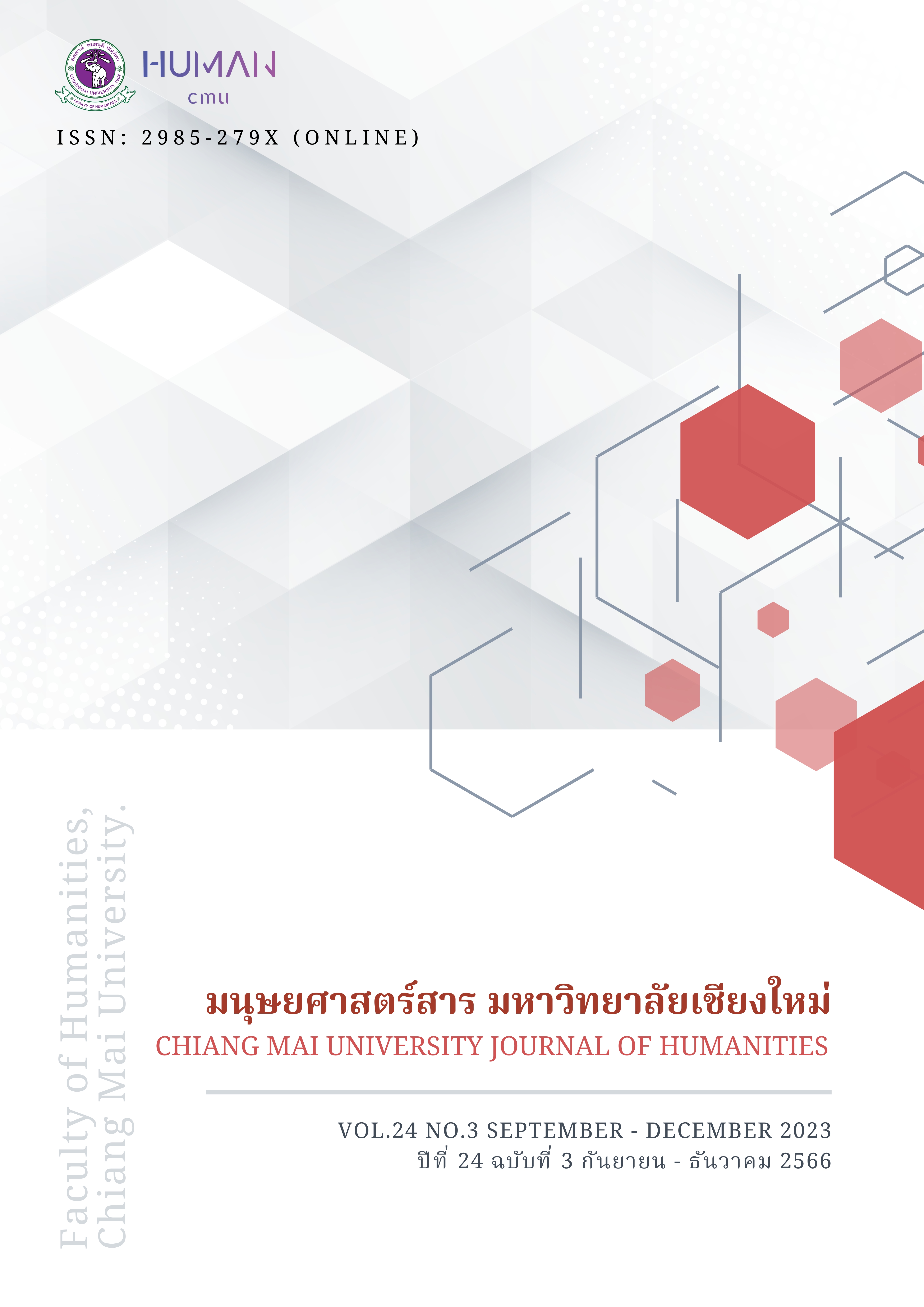จริยธรรมการแปล: เสียงสะท้อนการแปลในโลกดิจิทัลโดยกลุ่มแฟนในประเทศไทย
Main Article Content
บทคัดย่อ
บทความนี้ศึกษาประเด็นจริยธรรมการแปลในบริบทโลกปัจจุบัน โดยมุ่งเน้นไปที่การแปลของกลุ่มแฟนในสังคมไทย การแปลเป็นกระบวนการถ่ายทอดความหมายจากภาษาหนึ่งไปสู่อีกภาษาหนึ่ง และยังจัดเป็นกิจกรรมทางสังคมที่อาศัยทรัพยากรทางเทคโนโลยีบนอินเตอร์เน็ตมากขึ้นเรื่อย ๆ งานศึกษาเรื่องจริยธรรมการแปลที่ผ่านมาส่วนใหญ่จะเน้นเรื่องแนวทางปฏิบัติในฐานะการแปลเป็นอาชีพ แต่อาจไม่ได้คำนึงถึงผลกระทบของเทคโนโลยีและสังคมดิจิทัลมากนัก ในขณะเดียวกันแม้ว่าอินเตอร์เน็ตจะช่วยให้คนสามารถติดต่อสื่อสารแบบไร้พรมแดน แต่อิทธิพลจากความเชื่อทางวัฒนธรรมยังคงส่งผลต่อผู้ใช้อินเตอร์เน็ต บทความนี้เล็งเห็นความสำคัญของผลกระทบทางเทคโนโลยีและวัฒนธรรม จึงวิเคราะห์ประเด็นด้านจริยธรรมการแปลโดยกลุ่มแฟนในบริบทสังคมไทยโดยใช้แนวคิดพหุนิยมทางจริยธรรม (ethical pluralism) ซึ่งนำเสนอโดย Ess (2006, 2014) กล่าวโดยสรุป กิจกรรมการแปลนิยายและการแปลสื่อโสตทัศน์ที่ดำเนินการโดยผู้ประกอบการและนักแปลที่เป็นกลุ่มแฟนในประเทศไทยปัจจุบันแสดงให้เห็นว่ามุมมองพหุนิยมทางจริยธรรมอาจเป็นแนวทางที่สามารถสนับสนุนการรักษาสิทธิความเป็นเจ้าของของผู้ผลิตและทรัพย์สินทางปัญญา รวมถึงความเชื่อเรื่องการแบ่งปันและความเอื้อเฟื้อเผื่อแผ่ในชุมชนที่เป็นส่วนหนึ่งของวัฒนธรรมไทยได้
Article Details

อนุญาตภายใต้เงื่อนไข Creative Commons Attribution-NonCommercial-NoDerivatives 4.0 International License.
เอกสารอ้างอิง
Abdallah, K. (2012). Translators in production networks: Reflections on agency, quality and ethics [Doctoral dissertation]. UEF ERepository. http://urn.fi/URN:ISBN:978-952-61-0609-0
Baker, M. (2018). In other words: A coursebook on translation (3rd ed.). Routledge.
Bassnett, S. (2014). Translation studies (4th ed.). Routledge.
Bhattarakosol, P. (2007). Interactions among Thai culture, ICT, and IT ethics. In S. Hongladarom & C. Ess (Eds.), Information technology ethics: Cultural perspectives (pp. 138-152). Idea Group Reference.
Capurro, R. (2005). Information ethics. CSI Communications, 28(12), 7-10.
Chesterman, A. (2009). Ethics of translation. In M. Baker (Ed.), Translation studies, 3 (pp. 34-43). Routledge.
Chittiphalangsri, P. (2019). From plagiarism to incense sticks: The making of self and the other in Thai translation history. In Y. Gambier & U. Stecconi (Eds.), A world atlas of translation (pp. 105-124). John Benjamins Publishing Company.
Chueng, M. (2014). Chinese discourse on translation as intercultural communication: The story of jihe (幾何). In J. House (Ed.), Translation: A multidisciplinary approach (pp. 56-72). Palgrave Macmillan.
Chucherd, E. (16 November 2016). Kodhit announced stopping their practice of subtitling Korean TV series broadcast on SBS-MBC after warning of legal action [Kodhit ประกาศเลิกทำซับซีรี่ส์เกาหลีค่าย SBS-MBC หลังถูกขู่ฟ้อง]. Beartai. https://www.beartai.com/news/it-thai-news/133668
Drugan, J. (2011). Translation ethics wikified: How far do professional codes of ethics and practice apply to non-professionally produced translation?. Linguistica Antverpiensia, New Series – Themes in Translation Studies, 10, 111-127.
Ess, C. (2006). Ethical pluralism and global information ethics. Ethics and Information Technology, 8(4), 215-226.
Ess, C. (2014). Digital media ethics: Digital media and society series (2nd ed.). Polity.
Guangqin, X. (2021). Translation ethics in the Chinese tradition. In K. Koskinen & N.K. Pokorn (Eds.), The Routledge handbook of translation and ethics (pp. 25-41). Routledge.
Hartley, J. (2004). Democratainment. In R.C. Allen & A. Hill (Eds.), The television studies reader (pp. 524-533). Routledge.
Hongladarom, S. (2014). Buddhism and intellectual property rights: The role of compassion. Journal of Buddhist Ethics, 21, 435-452.
Hongladarom, S. (2016). Intercultural information ethics: A pragmatic consideration. In M. Kelly & J. Bileby (Eds.), Information cultures in the digital age: A festschrift in honor of Rafael Capurro (pp.191-206). Springer.
Hongladarom, S. (2020). Trust and reputation in the sharing economy: Toward a peer-to-peer ethics. International Review of Information Ethics, 28(6), 1-7.
Hongladarom, S., & Ess, C. (2007). Preface. In S. Hongladarom & C. Ess (Eds.), Information technology ethics: Cultural perspectives (pp. xi-xxxiii). Idea Group Reference.
Inghilleri, (2020). Ethics. In M. Baker & G. Saldanha (Eds.), Routledge encyclopedia of translation studies (pp. 162-167). Routledge.
Kenny, D. (2011). The ethics of machine translation. In S. Ferner (Ed.), Proceedings of the XI NZSTI National Conference (pp. 121-131). NZSTI.
Koskinen, K. (2000). Beyond ambivalence: Postmodernity and the ethics of translation [Doctoral dissertation]. Trepo. https://trepo.tuni.fi/handle/10024/67049
Koskinen, K., & Pokorn, N. K. (2021). Ethics and translation: An introduction. In K. Koskinen & N. K. Pokorn (Eds.), The Routledge handbook of translation and ethics (pp. 1-10). Routledge.
Kuppako, D. (2016). Buddhism in Thai life: Thai model for ASEAN. Mahachula Academic Journal, 3(1), 138-158.
McDonough Dolmaya, J. (2011). The ethics of crowdsourcing. Linguistica Antverpiensia, New Series – Themes in Translation Studies, 10, 97-110.
Payutto, P. A. (2012). Thai Buddhism in the Buddhist world: A survey of the Buddhist situation against a historical background (7th ed.). Chandrapen Publishing House.
Pérez-González, L., & Susam-Saraeva, Ş. (2012). Non-professionals translating and interpreting. The Translator, 18(2), 149-165.
Petchwathana, C. (2016). Translation of Thailand in the 21st century. Journal of Translation and Interpretation Thailand, 1(1), 16-49.
Pym, A. (2001). Introduction. The Translator, 7(2), 129-138.
Rohitasthira, B. (29 June 2021). Cabinet resolutions on issues of Ministry of Education [มติ ครม.ที่เกี่ยวข้องกับกระทรวงศึกษาธิการ]. MOE360. https://moe360.blog/2021/06/30/cabinet-resolution-29062564/
Thairath. (11 December 2020). Issues learned from “What has Thai youth been reading?” seminar: Consciousness of Thai political-social books among youth [เก็บตกเสวนา “เด็กไทยอ่านอะไรอยู่” ความตื่นตัวของหนังสือว่าด้วยสังคม-การเมืองไทยในเยาวชน]. Thairath. https://www.thairath.co.th/lifestyle/life/1993280
Translators and Interpreters Association of Thailand. (n.d.). History of the Association [ประวัติสมาคม]. Translators and Interpreters Association of Thailand. http://www.thaitiat.org/about-us/
Venuti, L. (1998). The scandals of translation: Towards an ethics of difference. Routledge.
Wongseree, T. (2018). Understanding Thai fansubbing: Collaboration in fan communities translating a Korean TV show [Doctoral dissertation]. DCU Online Research Access Service. http://doras.dcu.ie/22113/


